|
|
|
Sort Order |
|
|
|
Items / Page
|
|
|
|
|
|
|
| Srl | Item |
| 1 |
ID:
091151
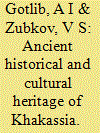

|
|
|
|
|
| Publication |
2009.
|
| Summary/Abstract |
Khakassia, quite often and quite fairly, is called a museum in the open air and an Archaeological Mecca. Those who have been living on the territory of the Republic of Khakassia and those who come here inevitably meet with rich and unique, historical and cultural heritage bequeathed by hundreds of generations of people.
|
|
|
|
|
|
|
|
|
|
|
|
|
|
|
|
| 2 |
ID:
084933
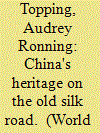

|
|
|
| 3 |
ID:
173334
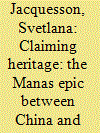

|
|
|
|
|
| Summary/Abstract |
In this article I argue that the renewed promotion of the Manas epic in Kyrgyzstan after 2010 should not be reduced to an attempt to consolidate a national identity or strengthen the state by endorsing ethno-nationalism. Instead, since the 2009 inscription of the Manas epic on the UNESCO List of Intangible Heritage by China, Kyrgyzstan has undertaken a full-scale heritagization not only of the Manas epic but also of its other tangible or intangible cultural assets. This heritagization has been shaped by an anxiety that Kyrgyzstan’s most valuable cultural asset might be appropriated by China. By shifting the focus from Manas as a potential national role model to the epic as national heritage, I suggest that Kyrgyzstan’s latest outburst of ‘Manasification’ is better understood as an attempt to resist China’s ongoing attempts to harness the heritage discourse in rewriting the cultural and historical narrative of Eurasia.
|
|
|
|
|
|
|
|
|
|
|
|
|
|
|
|
| 4 |
ID:
096369
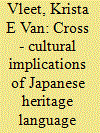

|
|
|
|
|
| Publication |
2010.
|
| Summary/Abstract |
Scholars of regions where multiple languages are spoken have much to gain by considering heritage language education, individual identity, and state power through these ethnographic and historical cases that focus on Japan and the Japanese diaspora. The articles in this two-part collection offer insights into the interrelationships of linguistic hierarchies and political economy, the navigation of ethnic and racial subjectivities, and the ways children and adolescents claim belonging to various communities through their linguistic practices. The articles interrogate not only heritage but remembrance and the ways individuals may produce identity through language in everyday interactions and institutional settings.
|
|
|
|
|
|
|
|
|
|
|
|
|
|
|
|
| 5 |
ID:
135000
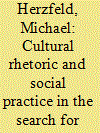

|
|
|
|
|
| Summary/Abstract |
A Bangkok community that has successfully warded off the threat of collective eviction for over 20 years, Pom Mahakan – located in the symbolically dense historic old dynastic city, next to the wall associated with the latter's foundation – has aimed at a plan of accommodation between housing rights and historic conservation that deserves serious consideration as a model for emulation. Yet the community still struggles to stay on-site; its currently dubious legal status, resulting from an ill-advised acceptance of an eminent domain order on which the community subsequently reneged on the grounds of inadequate compensation, may typify other such cases, and this suggests an urgent need for legal reform so that the authorities can ratify the community's plan and enable other communities to follow its lead. This article thus explores the wider implications of the Pom Mahakan case for social justice as well as heritage conservation in and beyond the Thai polity, taking particular account of the tension between egalitarian and authoritarian impulses that continues to characterize this nation-state and especially its political and bureaucratic life.
|
|
|
|
|
|
|
|
|
|
|
|
|
|
|
|
| 6 |
ID:
148514
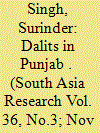

|
|
|
|
|
| Summary/Abstract |
Rising cultural consciousness among Dalits in Punjab underpins recent endeavours to construct a distinct identity and cultural heritage. The article examines how this renovation of identity and culture, centred on claiming and gaining social esteem and self-respect, is visibly expressed in heritage construction, with important support through transnational diasporic connections. This article shows specifically how monetary and ideational inputs for construction of two Ad Dharmi jathera shrines have created an impressive monumental heritage that promotes and reflects rising cultural confidence among the Dalits in Punjab and generates enthusiasm in the whole community. This provides them assurances of a more respectable life, both at home and abroad, yet also introduces new divisions and diversities.
|
|
|
|
|
|
|
|
|
|
|
|
|
|
|
|
| 7 |
ID:
139467
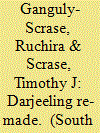

|
|
|
|
|
| Summary/Abstract |
Darjeeling today faces problems of congestion, pollution and loss of landscape aesthetics. Increased mobility and in-migration has created urban sprawl. Much of Darjeeling's architectural heritage has disappeared and many new constructions have come up to cater to the growing population, particularly the rising number of rural migrants who have been compelled to leave their homes due to diminishing rural employment. Based on ethnographic research and interviews with Darjeeling's residents, we examine the struggle for control over Darjeeling's fast-disappearing heritage, its loss of ‘charm’ as a tourist town, and its rapid transformation into a bustling, urban city reminiscent of many regional towns in India.
|
|
|
|
|
|
|
|
|
|
|
|
|
|
|
|
| 8 |
ID:
144172
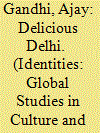

|
|
|
|
|
| Summary/Abstract |
This article examines how Old Delhi is represented and recreated in contemporary India. Delhi’s old city was once the locus of pre-colonial Mughal sovereignty. It is now often encountered via nationalist spectacles, mass-media images and consumption practices. Paralleling neo-liberalism’s onset in the 1990s, its street food, bazaar spaces and historical monuments have been avidly appropriated by reigning institutions and classes. Old Delhi suggests that which the new India has left behind; yet this displacement also elicits longing for what has been lost.
This medieval remnant can therefore be considered the site of nostalgia consumed by a globalised middle class. This article presents an ethnography of Old Delhi’s invocation in New Delhi’s cultural landscape, including malls, newspapers, heritage sites, hotels, and food courts. In triangulating among the realms of nationalist nostalgia, middle-class identity and mediated consumption, it emphasises how India’s neoliberal emergence is bound up with the co-opting of the past.
|
|
|
|
|
|
|
|
|
|
|
|
|
|
|
|
| 9 |
ID:
120723
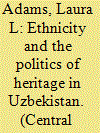

|
|
|
|
|
| Publication |
2013.
|
| Summary/Abstract |
The UNESCO office in Uzbekistan has been relatively successful in nominating cultural practices to The Representative List of the Intangible Cultural Heritage of Humanity. Selection for the List conveys prestige and draws international attention to local culture that is deemed of universal value. What is striking about the first successful nominations from Uzbekistan is that they point to the inseparability of Tajik and Uzbek culture, a touchy subject for both Uzbekistan and Tajikistan. In this article the author looks at how the politics of ethnic cultural heritage play out through these projects, highlighting the tensions between a rhetoric of diversity promoted both by UNESCO and by the official national ideology, and practices that demonstrate a more mundane, ethnically exclusive sense of national culture. Although ostensibly celebrating the rich diversity of Uzbekistan's national culture and eschewing the strict delineation of Tajik culture from Uzbek culture, the effect of UNESCO Intangible Cultural Heritage programmes is to perpetuate the occlusion of Tajik culture in Uzbekistan.
|
|
|
|
|
|
|
|
|
|
|
|
|
|
|
|
| 10 |
ID:
181870
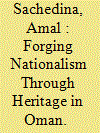

|
|
|
|
|
| Summary/Abstract |
During his five-decade reign, Sultan Qaboos bin Said relied on heritage as a key tool for nation-building. Old forts and objects central to Omani traditional culture like the coffee urn and the ceremonial dagger became symbols of a unifying national ethos. At the same time, their former political significance was downplayed. But some Omanis have held onto memories of a different conception of the past. And now, after the sultan’s death in 2020, heritage is becoming more of a privatized business sector.
|
|
|
|
|
|
|
|
|
|
|
|
|
|
|
|
| 11 |
ID:
106988
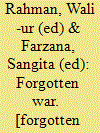

|
|
|
|
|
| Publication |
Dhaka, Bangladesh Heritage foundation, 2011.
|
| Description |
181p.
|
| Standard Number |
9789843323590
|
|
|
|
|
|
|
|
|
|
|
|
Copies: C:1/I:0,R:0,Q:0
Circulation
| Accession# | Call# | Current Location | Status | Policy | Location |
| 056158 | 954.9205/RAH 056158 | Main | On Shelf | General | |
|
|
|
|
| 12 |
ID:
186907
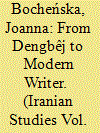

|
|
|
|
|
| Summary/Abstract |
Based on a textual analysis of the selected works of two writers from Turkey, Mehmed Uzun (1953–2007) and Mehmet Dicle (b.1977), as well as interviews with Kurdish writers and folklore collectors, this study focuses on the links between Kurdish folklore and modern Kurdish literature. Following Gregory Ashcroft's take on heritage, I argue that Kurdish writers’ approach to folkloric motives has evolved through the impact of growing literary experience, inspiration from world literature and deepening knowledge of the Kurdish oral tradition. What is more, Kurdish literature can be treated as an example of cultural and language revitalization, which – according to Justyna Olko – is based on acting in and through the heritage language. Following Doreen Massey's concept of a progressive sense of place, I identify Uzun and Dicle's strategy as linking the local to the universal, suggesting that Kurdish literature should be analyzed within the context of a political geography beyond nationalism.
|
|
|
|
|
|
|
|
|
|
|
|
|
|
|
|
| 13 |
ID:
190726
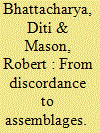

|
|
|
|
|
| Summary/Abstract |
This article examines two cities of discordant colonial heritage in India—Chandernagore, a former French colony in West Bengal, and Panjim, a former Portuguese territory in Goa—to demonstrate how these cities experience their colonial identities through heritage spaces. It explores the ways in which the museums and public spaces of these cities use memory and materiality to perform discordant colonial pasts which differ from the dominant narrative of the British Raj. Conceptualising discordance as a framework to trace the unique ways in which the museums and public heritage sites of these two cities mobilise their French and Portuguese colonial heritage, the article shows how these discordant colonial cities distinguish themselves from the British Raj and its legacies. The article affirms these differences not in terms of a duality, but a continual process of convergence and divergence that is mutually constitutive of heritage practices in the cities.
|
|
|
|
|
|
|
|
|
|
|
|
|
|
|
|
| 14 |
ID:
181533
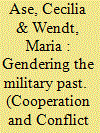

|
|
|
|
|
| Summary/Abstract |
This article showcases how a feminist perspective provides novel insights into the relations between military heritage/history and national security politics. We argue that analysing how gender and sexualities operate at military heritage sites reveals how these operations dis/encourage particular understandings of security and limit the range of acceptable national protection policies. Two recent initiatives to preserve the military heritage of the Cold War period in Sweden are examined: the Cold War exhibits at Air Force Museum in Linköping and the redevelopment of a formerly sealed off military compound at Bungenäs, where bunkers have been remade into exclusive summer homes. By combining feminist international relations and critical heritage studies, we unpack the material, affective and embodied underpinnings of security produced at military heritage sites. A key conclusion is that the way heritagization incorporates the ‘naturalness’ of the gender binary and heterosexuality makes conceptualizing security without territory, or territory without military protection, inaccessible. The gendering of emotions and architectural and spatial arrangements supports historical narratives that privilege masculine protection and reinforce a taken-for-granted nativist community. A feminist analysis of military heritage highlights how gender and sexualities restrict security imaginaries; that is, understandings of what is conceivable as security.
|
|
|
|
|
|
|
|
|
|
|
|
|
|
|
|
| 15 |
ID:
192981
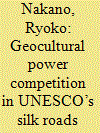

|
|
|
|
|
| Summary/Abstract |
Since Chinese President Xi Jinping announced the Belt and Road Initiative in 2013, China has increasingly engaged in UNESCO’s Silk Roads project. China’s emphasis on its western routes signals its strategic interest in the reconstruction of its historical connections that matches China’s global networking in Eurasia, the Middle East, and Europe. However, whether China will successfully reformulate the international visions of the past, present, and future for its benefit remains an open question. This article focuses on the responses from Japan and South Korea, both of which hold critical positions as the owners of eastern Silk Roads heritage and the funders of UNESCO’s Silk Roads heritage studies and World Heritage nomination assistance. Extending the conceptual framework of memory infrastructure to the study of heritage politics and diplomacy highlights the competitive aspect of a transnational heritage project in shaping and reshaping historical and contemporary geographical landscapes.
|
|
|
|
|
|
|
|
|
|
|
|
|
|
|
|
| 16 |
ID:
140378
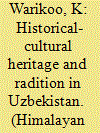

|
|
|
| 17 |
ID:
189717
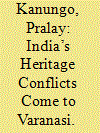

|
|
|
|
|
| Summary/Abstract |
India’s ruling Hindu nationalist party is pursuing a campaign to revise history and remove historic Islamic monuments from cities like Varanasi, known for its multicultural fabric.
|
|
|
|
|
|
|
|
|
|
|
|
|
|
|
|
| 18 |
ID:
096366
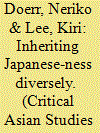

|
|
|
|
|
| Publication |
2010.
|
| Summary/Abstract |
The late twentieth century saw a rise of global discourse about heritage. Research on heritage politics, however, has shed little light on heritage practices in schools, especially regarding language, that is, how heritage language is constructed and how it is "inherited" by students of various backgrounds. Heritage language education is often viewed as a means to empower heritage language speakers or to address the diverse needs of students in language classes. In existing works, the individual's link to "heritage" is assumed as given and stable. More recent works show that the processes and effects of heritage language education are complex and nuanced due to diverse personal backgrounds and changing political economy and cultural politics. The role of schooling in the process of "inheriting" language, however, has not attracted much attention: how students are grouped or tracked into a particular class, for example. After ethnographically investigating various views and practices at a weekend Japanese language school in the northeastern United States throughout 2007 and 2008, the authors of this article argue that heritage language school is not merely a place to reproduce "heritage" by passing it on to students, but it is also a productive site where ways to imagine "heritage" and "inherit" it proliferate. The article analyzes the processes by which what would be considered as merely "speaking Japanese" and "being Japanese" outside heritage language school are differentiated into diverse ways of being Japanese. It suggests a need to investigate school as a site of heritage politics as well as a need for researchers and practitioners to view heritage language education not only as a way to teach language but also as a means to gain an understanding of heritage politics.
|
|
|
|
|
|
|
|
|
|
|
|
|
|
|
|
| 19 |
ID:
098331
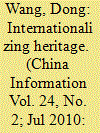

|
|
|
|
|
| Publication |
2010.
|
| Summary/Abstract |
As a new but influential international and local institution, UNESCO's World Heritage List constitutes an important sector of the continued internationalization in China, which has yet to be factored in by scholars researching China's reopening and integration into the global community. The notion of deregulation or "bringing down institutional barriers" in trade, politics, society, and education- disproportionately emphasized in most of the literature-is insufficient to understand important elements of internationalization such as national heritage. The ongoing internationalization of China's key heritage sites originated primarily in international appreciation of their significance- and expeditions to explore them-as well as in the historical rediscovery of their own cultural treasures by Chinese at various periods in the past. Both globalization and internationalization result in a strengthened state on multilevels under certain circumstances. The synergistic process of collaboration, resistance, confrontation, and compromise that produces internationalization, as evidenced by UNESCO's Longmen Grottoes, is not a simple zero-sum situation for the state party, community, ordinary citizens, and international actors involved. In the case of Luoyang, the tensions between universal internationalism, particular nationalism, and diverse localism were reconciled through developments managed by the state and its subordinate governments.
|
|
|
|
|
|
|
|
|
|
|
|
|
|
|
|
| 20 |
ID:
117111
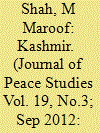

|
|
|
|
|
|
|
|